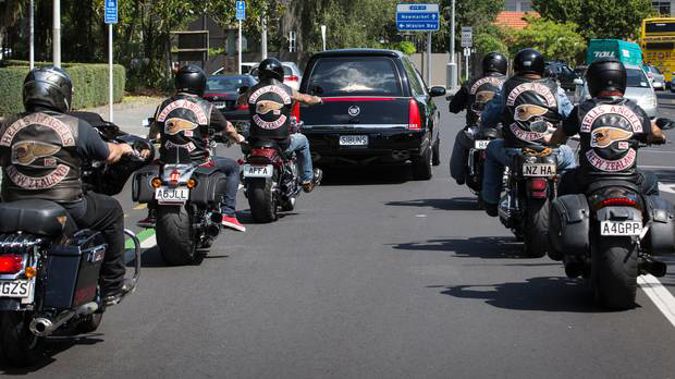The daughter of a senior Hells Angel gang member was recruited into Police College, then suspended shortly before her wing graduated after the relationship was vetted more closely.
The young woman declared the family ties to her father - it is believed she claimed to be estranged from him - during the application process and was accepted into the 16-week programme this year.

The Hells Angels are an international motorcycle club with chapters in New Zealand.
She was well-regarded in her time at Police College but was stood down from her training wing shortly before her peers graduated this year, after further vetting checks were made about her relationship with her father.
The Herald understands she is still listed as a police recruit and the matter is now the subject of an internal employment investigation.
Police bosses have declined to comment, citing privacy concerns.
But given the family relationship to a Hells Angel member, Herald sources said those vetting checks which led to the suspension should have been made before she was offered a position in Police College.
"It's totally unfair on her. These vetting checks should have been made earlier and the application declined at that stage, if that was the case," said one source.
"Staff have said she was training well, could have been a good cop. Perhaps she was naive in failing to see what the issue was. But the situation has became very ugly."
The police recruit did not respond to messages from the Herald seeking comment.
There is no suggestion she was a 'plant' to gather intelligence for the Hells Angels, who are considered one of the original motorcycle gangs in New Zealand.
But there are understandable concerns about any family ties or close links between organised crime figures and police officers, who can access sensitive data and intelligence.
Even if the friendship or family relationship involving a police officer is currently estranged, there can be a potential risk of compromise in the future.
This was why a number of police officers who spoke to the Herald were surprised the father-daughter relationship was not put under closer scrutiny before she was recruited into the police.
In response, Police National Headquarters declined to answer questions.
"New Zealand Police have the same privacy obligations when it comes to employment matters as any other employer so we are unable to comment on this further," Superintendent Scott Fraser, who is in charge of training, said in a written statement.
He said the current graduation rate from Police College is more than 98 per cent.
"New Zealand Police have a very high recruiting and training standards and the standards expected of our recruits have not changed and any recruit who does not meet the standards will not graduate."
By international standards, New Zealand police are considered to be among the least corrupt in the world.
However, in recent years, a number of police officers have been convicted of leaking information to criminals.
And the vast amounts of cash to be made in the methamphetamine trade, as well as the growing sophistication of organised crime, creates a risk law enforcement and other officials could be ensnared in corrupt behaviour.
On top of this, recruitment of police has become a political football after the Government announced funding for an extra 1800 officers over three years.
This was part of the coalition agreement between Labour and New Zealand First following the 2017 election.
But as of June this year, the Police Association said the actual increase in the total number of new sworn staff was just 472, once attrition was taken into account.
With a year to the next election, the National Party said Police Minister Stuart Nash's promise of 1800 extra frontline staff was in "tatters".
In response, Nash said a record number of 831 officers had graduated from Police College this year.
"This financial year, we'll be graduating 900 officers, and since we have been in Government there have been 1367 new officers heading out into communities," Nash told Parliament in June.
"One thing I can say is we have no control over attrition. But the other thing I can say is that there are a hell of a lot more police heading out into communities than there ever would've been under [a National] Government."
